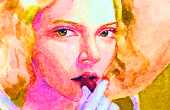SBee
Contributing writer for The Artifice.
Contributor I
- Lurker
- Sharp-Eyed Citizen
- ?
- Articles
2 - Featured
2 - Comments
8
- Ext. Comments
6 - Processed
4 - Revisions
4
- Topics
3 - Topics Taken
2 - Notes
6
- Topics Proc.
5 - Topics Rev.
1
- Points
530 - Rank
X - Score
240
Latest Articles
Latest Topics
Turning Red and the Female GazeThe recent Disney / Pixar film Turning Red has been widely celebrated not only for being enjoyable, but for showcasing a touching and realistic portrayal of teenage girlhood, with all its joys and sorrows. However, it also sparked an immediate negative response from a wide variety of critics saying they felt the intended audience was "too narrow" or "not relatable enough." Women and racialized people have had to watch films intended for white men for as long as the medium has existed, and still enjoy movies without being the exact target audience. What is it about movies intended for other audiences that make otherwise enjoyable movies, such as the delightful Turning Red, so uncomfortable for the white male audience?
|
Adult Escape into Children's TVOver the past few years, many TV shows designed for and marketed towards children have amassed large adult / new adult fan bases. My Little Pony, Miraculous Ladybug, Owl House, and She-Ra are some examples. What is it about children's TV that draws older viewers in? Often these adult fandoms are active on platforms such as Reddit, do these platforms facilitate these fandoms or are the platforms merely making them more public? Or, from a different angle, does a large adult fan base have an impact on the trajectory of a children's show? (Ex: Some of the shows listed showcased queer representation in later seasons that was largely cheered on by the older fans).
|
Healthy Relationships in Romantic ComediesRomcoms are an incredibly popular genre, and some of the relationships – from the perfect meet-cute to the inevitable dramatic finale – are truly dream-worthy. But a lot of romantic comedies also feature clearly unhealthy relationships. Consider The Wedding Planner, where the male lead is engaged for the majority of the film, or How to Lose a Guy in 10 Days, where both sides of the couple are trying to trick one another. There are countless other examples. It would be interesting to explore why this is. Does a relationship need to be unhealthy (or, commonly, founded upon lies) to be "funny"? Why can we set aside critical judgement of blatantly unhealthy behaviours when we're watching these movies?
|
Latest Comments
| Are Immersive Exhibitions Ruining Art? | |
Thank you! I totally agree, there are parts of the book/movies where I am absolutely rooting against Emma. But I think the domestic tone of the novel makes her transgressions very relatable for the reader/viewer. Everyone’s said something that came across a lot crueler than they meant in a social situation! So watching Emma learn from her mistakes, and seeing the forgiveness of those around her, is almost relieving in a way. Maybe we can all be forgiven for our mistakes too 🙂 | Jane Austen's 'Emma': How Austen Writes an Independent Woman |
This is a really fun article. I’ve never seen these issues put into this perspective before, and I can definitely relate to some of the challenges they present! I’ve always taken the mindset that a truly awful first draft is better than no draft at all. I also find that, most of the time, once you’ve taken some time away from your writing it appears better with fresh eyes. I think one of the challenges is that as we grow older creativity seems to be more of a means to an end than a reward itself. As a kid, I would write ridiculous short stories and share them with everyone around me because I had fun writing them and that made them good in my eyes. Now, unless I’ve agonized over any piece of writing for hours, days, or even weeks, I can’t stand to have anyone else look at it. When did this fear of sharing develop? | A Short Guide to a Writer's Imaginary Critics |
Really interesting read. I particularly enjoyed the discussion at the end about the morality of freeing someone from “The Cave.” If we were to extend this discussion into the real world, where morality is much greyer than we see in the media texts you’ve mentioned, there would be some compelling debates to be had about what “free” is, and who gets to decide what knowledge constitutes “enlightened.” | Plato's Cave and the Construction of Reality in Postmodern Movies |
Today it seems easier for people to imagine a dystopian future than a utopian one. Are we simply too aware of the violence other humans are capable of? Or our fundamental inability to cooperate? Maybe. However, popular imaginings of the future used to be very optimistic, imagining flying cars and colonies on Mars, peace on Earth, etc. I’m curious as to why we have collectively shifted from imagining a Jetsons-esque future, to imagining a future in ruins. | Why Is Utopian Literature Less Popular Than Dystopian Literature? |
Ramona the Pest was a significant book for me when I was a kid. I was in third grade and had begun to struggle with paying attention in class, something that I’d never experienced before. (Significantly, 8 is around the age where attention disorders begin to show in children). My third grade teacher definitely considered me to be a pest as a result. Seeing a reflection of an imperfect child in media, one whose teachers also find her to be a handful and who sometimes does things that others consider strange or outside of the unspoken social order can have a great positive impact on students struggling with learning or developmental disorders. Ramona makes mistakes, she misunderstands social cues, but she is still shown love. She is allowed to make mistakes and grow from them, though she is not expected to immediately morph into the perfect child. If nothing else, it made her more fun to read about! | The Legacy of Ramona Quimby |
Great article, I can tell by the level of detail that you’re really invested in this subject. It’s interesting to consider why preservation for more traditional forms of art seems so much more important than video games. Though I’d argue that you see the same flippant attitude towards comic books, perhaps only now changing, which makes me wonder what makes some forms of art less valuable than others? I also think this discussion could be extended to the recent dropping of Flash from Google Chrome, and the hundreds if not thousands of Flash games that have become unplayable. Now, did I regularly play Flash games before Chrome dropped its support? No. That was something I did a lot as a kid, but not so much now. But my argument is that real people invested hours of their time and scores of creative energy into making something that other people would enjoy. Those people and their art is now lost, through no choice or fault of their own, other than using technology that was a product of its time. Google decided that their art wasn’t worth existing anymore. All media carries value, and losing all copies of a work irrevocably and forever is a loss for humanity’s collective body of knowledge, however small. | The Importance of Digital Media Preservation |
Really great article. My favourite part of the film has always been that, at ANY point, Elle could have toned down her femininity to make herself more acceptable to her peers. Despite this, she shows no indication of even considering it. She may consider dropping her pursuit of law as she struggles with the prejudice she’s facing, but she never considers ditching her pink clothing or her regular manicures. Her strength of characters stems from her feminine side. I think one aspect of the movie that bears discussing is how Elle and Vivian become friends at the end. Other than petty remarks, Elle does not tear down the women around her. She also preserves Brooke’s weight loss secret, despite this jeopardizing Callahan’s case. In this way, not only does Elle draw strength from her femininity, but she doesn’t use her power to tear down the women around her. I think this could add another interesting layer to the discussion of the film as a positive demonstration of women’s relationships for young girls, particularly given the “women tearing down women” so commonly seen in media today. | Elle Woods for the defence (of femininity) |


Hey, let’s keep it civil here. I wrote this article because there are strong opinions on both sides, neither of which is totally right or wrong.